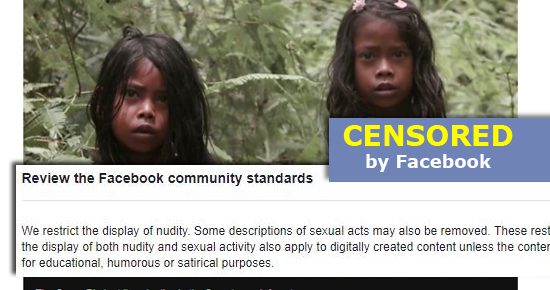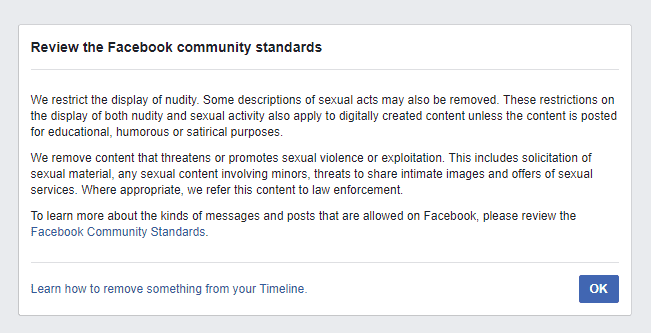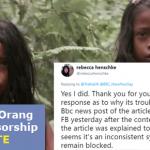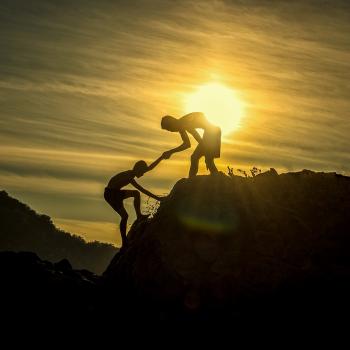I’m sure some Pagans reading this have occasionally fallen foul of Facebook’s image policies. Pagans tend to be pretty body-positive. We’re quite well-known for performing rituals naked, and our iconography is full of sexual symbols and full-figured goddesses.
This means that there are some aspects of our practice that we cannot share on Facebook – specifically, anything involving nudity. The social media’s community standards are so rigid that even pictures featuring female nipples, menstruation and plus-sized women have been regularly removed.
One can argue that these policies are illiberal, discriminatory and misogynistic. But Pagans and other body-positive people are generally willing to tow the line and obey these policies in order to use the service. Some of these images would be banned from many other public spaces too. And Facebook has backed down on some of its more ridiculous policies.
But there are still some cases where Facebook’s censorship goes too far. So far that it ends up silencing those who need to be seen and heard most of all on social media.

Last week, a member of a Facebook group I manage tried to share this BBC News piece. It’s a revealing, harrowing article about the Orang Rimba people of the Sumatran rainforest. Their homes are being destroyed to make way for palm oil plantations, and they are being forced to convert from their animistic, nature-based religion to Islam.
A story that the world needs to know.
But much of the world won’t know, thanks to Facebook’s bizarre censorship. The group member told me that Facebook had removed the preview image for the link, on the grounds that it violates Facebook’s community standards.
What was the terrible content of the preview image? Orang Rimba children.
The two young children in the photo, in accordance with their culture, have bare tops and accessories around their necks and in their hair. The image is cropped from the waist down; in fact, if you watch the video from which this still is taken, you’ll see that they are wearing sarongs. The children stare at the camera with uneasy curiosity. It’s an arresting picture of people from another culture – a culture that is being systematically destroyed.
Remember, the BBC chose this photo. BBC News are world-renowned for integrity and sensitivity. They aren’t in the habit of regularly posting offensive or disturbing pictures for shock value. But this photo was apparently too shocking for Facebook.
I couldn’t quite believe what had happened, so I tried posting the link with the preview photo myself. And sure enough, within seconds, the picture had been removed, and my account was locked until I acknowledged the following message:
I then had to go through a process of proving that I didn’t have any other nude pictures on my account before I was allowed to use it again.
Both myself and the group member complained to Facebook about this incident. I’m still waiting for my reply, but my friend reported that she received the following message:
“We reviewed your post again and confirmed that it doesn’t follow our Community Standards. We understand that you may not have known about the standards, so we encourage you to learn more about what you can share on Facebook”
So there we are. The initial removal of the image may have been the result of an over-zealous algorithm, but there’s no excuse for then failing to restore the picture once the complaint has been issued.
You may ask, why does this matter? So what if Facebook’s a bit prudish about nudity of tribal people?
It matters a lot. This kind of censorship is contributing to the demise of the Orang Rimba, and other indigenous cultures, for these reasons:
1 Facebook is erasing their presence
The Orang Rimba face two forms of persecution: physical genocide through the destruction of their forest homes, and cultural genocide by being forced to adopt a new religion and way of life. Their spiritual and cultural traditions are not recognised by the state, and they are seen as subhuman by many of the surrounding population. These people are being squeezed out of existence.
By censoring pictures of Orang Rimba, Facebook is further contributing to their erasure from the world. They are lending their persecutors a hand in wiping their presence from our knowledge.
2. Facebook is imposing Western cultural standards
The BBC story featuring the picture tells of how the Orang Rimba are having alien modesty standards imposed on them – the strict codes of Islam that force them to cover up. To most of us in the West, this seems shocking and appalling. But Facebook is doing the same thing when it censors picture of the Orang Rimba dressed traditionally.
Facebook has decided that, because these children dress differently to Western children, their photo is offensive. By not accepting pictures of children dressing according to tribal traditions, Facebook is saying that their culture is less valid than Western culture. It’s saying that children should conform to our modesty standards, and it is simultaneously validating the practices of the Islamists who force them to cover up.
(Don’t forget, the original photo already had been cropped to censor the bottom half of the children. It was only their top half that was visible. We can’t even tell whether or not the children are wearing anything from the waist down).
3. Facebook is taking away their voice
By removing the striking preview image from the link to the BBC story, Facebook is dramatically reducing the story’s visibility among crowded Facebook feeds. It also discourages users from sharing the story – no-one wants to go through the process of being treated like a sinner for sharing something that Facebook decides to block, and furthermore risk greater penalisation.
The result is that the voice of the Orang Rimba, already marginalised, is further silenced. They may well disappear without ever even being visible to most of the online world.
4. Facebook is sexualising their children
Look at the Facebook community standards again. They strongly equate nudity with sexuality.
These are prepubescent children in the photo. There is nothing whatsoever sexual about their bodies. The fact that Facebook suggests that their bodies are sexual is, to say the least, disturbing.
Censoring tribal people on social media in this manner not only damages them. It damages us. It insulates us all in our cultural bubbles, preventing and discouraging us from experiencing cultures and values different from our own. It restricts the information we have about the world, and tells us that we, too, should be ashamed of our bodies, and our children’s bodies.
If you experience similar issues, please complain to Facebook and let them know why their community standards need to change so that marginalised cultures experience no further erasure by our hands.

















